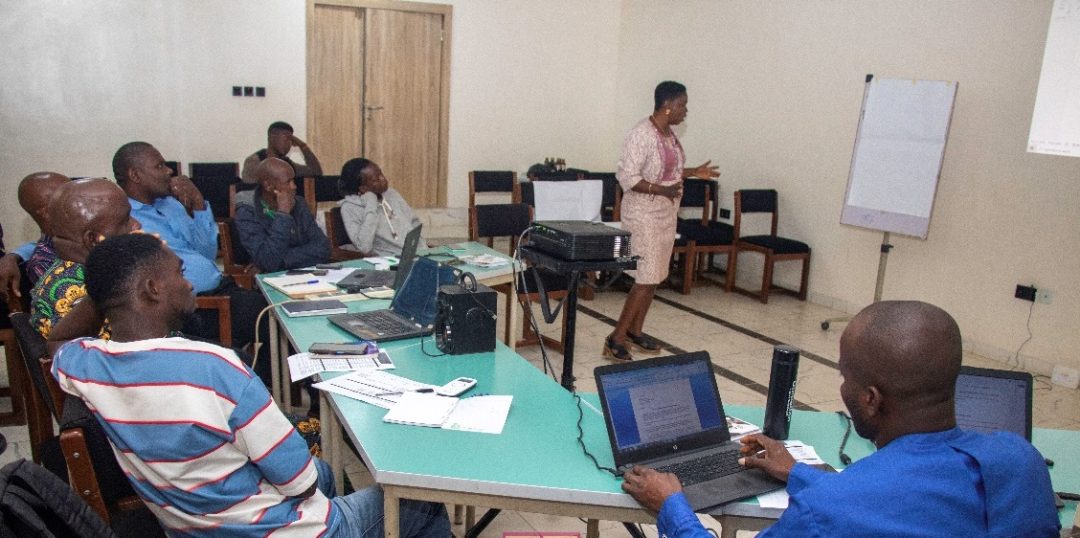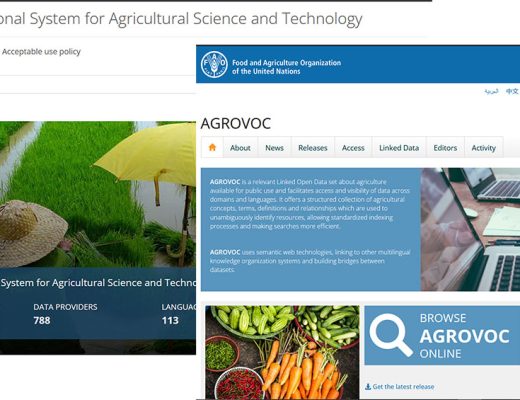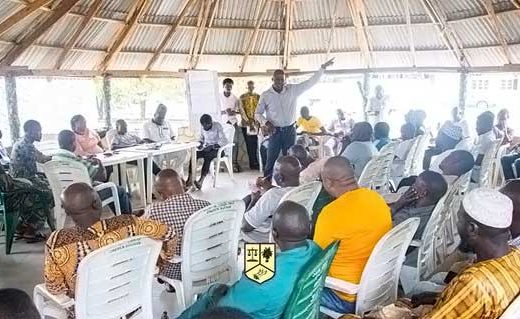In 2024, IITA–CGIAR, in collaboration with its Nigerian partner, the Justice Development and Peace Commission (JDPC), Ibadan, embarked on a strategic initiative to develop gender-transformative interventions (GTIs). These interventions were designed to challenge and address restrictive gender norms within the cassava agrifood system in Oyo State, Southwest Nigeria. This initiative forms part of broader efforts under the CGIAR Gender Equality and Inclusion (GEI) Accelerator, which aims to uncover and dismantle discriminatory social structures affecting agrifood systems in low-income countries.

The facilitator, Olajumoke Adeyeye training the participants during the ToT. (Photo credit: JDPC, Ibadan)
The intervention targets gender norms, including limiting women’s ownership and control of land and other productive assets, restrictions on their autonomy in buying or selling such assets, and barriers to participation in leadership roles within agricultural and business-related groups.
A key component of this journey involved documenting the experiences and reflections of JDPC’s program officers during the GTIs’ design and implementation phases. Their perspectives, as captured in this blog, reveal valuable lessons learned and highlight personal shifts in attitude following their participation in a Training of Trainers (ToT) workshop focused on GTI implementation.
Journey to Impact: Updates on gender transformative interventions for 2025
Building on the foundational work in 2024, IITA and JDPC Ibadan deepened their collaboration in 2025 by developing and finalizing technical and gender-transformative facilitator guides tailored for cassava groups. These guides were intended for use in the three target Local Government Areas (LGAs) of Oyo State: Ibarapa East, Ibarapa Central, and Ibarapa North.
The facilitator guides include structured gender-transformative dialogue sessions and community engagements on critical issues such as women’s ownership of land and productive assets, women’s autonomy in buying or selling assets, and women’s leadership in cassava-based and related groups.
In May 2025, a two-day review and contextualization workshop was held to allow JDPC program officers to refine these guides with technical support from the IITA team. This was followed by a pilot training on gender-transformative approaches in agrifood systems, aimed at strengthening the capacity of JDPC staff.
To prepare for the effective implementation of the GTIs, the GEI Accelerator organized a five-day Training of Trainers (ToT) from July 7 to 11, 2025, at the JDPC Headquarters in Ibadan. Nine program officers from the Agripreneur Unit/Integrated Development Program—JDPC’s designated unit for GTI implementation—participated in the training.

Participants in a plenary discussion during one of the sessions of the ToT.
(Photo credit: JDPC, Ibadan)
From training to transformation: Insights and experiences from the ToT on gender-transformative interventions
The ToT taught participants practical facilitation skills and exposed them to global best practices in conducting gender-transformative dialogues. Beyond the technical aspects, the training contributed to individual and institutional mindset shifts regarding women’s roles and rights in agrifood systems. Several participants reported an increased appreciation for women’s inclusion in resource ownership and community leadership decision-making. One program officer, Taiwo Adesiji explained,
“On a general note, this training has been remarkable for me. I have come to recognize the importance of going beyond merely increasing the number of women in leadership positions; it is also essential to ensure that women actively contribute and have a voice in decision-making related to those positions.”
Another program officer, Jumoke Oluwadepo attested,
“Personally, this training was insightful because I realized the significance of participating in decision-making at the household level instead of leaving all decisions to my husband.”
For some program officers, the training’s lessons have shifted their perspective about participating in household chores.
“Helping my wife with household chores is a key action I will be taking moving forward,” Adesiji affirmed.
Another program officer, Anthony Adedeji said, “This training has changed my perspective. My mindset has shifted, and I have pledged to always consider women’s needs and concerns in all our actions. We need to allow women to contribute to decision-making at the household and community levels. Also, supporting my wife with basic household chores when she is unavailable or busy with other things has become very important to me”.
Other program officers, Livinus Okedepo and Kayode Olubunmi emphasized that the training was a wake-up call for them to become change agents advocating for gender equality and women’s empowerment.
“The training has been a transformative experience in my life. It has deepened my understanding of gender issues within the cassava agrifood system and the broader community. I have gained practical skills to advocate for gender equality. Now, I see myself as an agent of change, committed to empowering women in my household and community,” Okedepo said.
Looking ahead: From training to impact
Many JDPC program officers affirmed that the training transformed their understanding of gender equality and strengthened their resolve to champion change. From July to December 2025, these trained officers will lead the implementation of the GTIs across their primary areas of assignment in Ibarapa East, Ibarapa Central, and Ibarapa North. As role models and facilitators, they are expected to drive meaningful, community-based conversations and practices that empower women and promote more equitable participation in the cassava agrifood system.
Contributed by Jumoke Adeyeye




No Comments